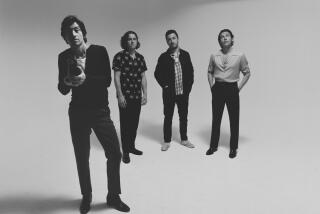Chairman? He’s More a Junior Exec
- Share via
NEWPORT BEACH — Halfway into his first set with a big band at Twin Palms on Friday, Frank Sinatra Jr. told the capacity crowd: “If you haven’t figured it out yet, this show is about the music. If you like jazz, you’ve come to the right place.”
The remark, innocent as it was, served to distance the singer from the cult of personality that shadows the Sinatra name, putting the spotlight on what was being performed, rather than on who was performing it. Additionally, it showed that, while the junior Sinatra favors the same music and saloon-singer tradition of his father, he’s definitely a different character.
Whether the capacity crowd took the message to heart is another matter. But Sinatra Jr., with warmth, self-deprecating humor, a modicum of singing talent and a great 19-piece orchestra (that even included a harp player), staked out his own territory during the performance, albeit one that definitely overlaps that of his father.
No matter how much the name invites comparison, it’s unfair to measure Sinatra Jr. (or any other singer for that matter) against his fabled father. Sure, there’s a shadow of his father’s smile to be seen on his face, and moments when his tone rings with the same warmth as his dad’s. But Junior’s voice is a far cry from the wonderful instrument the senior Sinatra once employed, causing the younger Sinatra to poke fun at himself, explaining that if he didn’t sing a tribute to his pops during his Las Vegas appearances, the audience went away thinking they’d seen Wayne Newton.
Sinatra Jr. made no secret of his love of the music and the nightclub lifestyle, spinning stories about the songs and their history. He pointed out that pundits mark 1946 as the year the nightclub came into acceptance (previously they were called speak-easies), making the lush-life tradition some 50 years old.
From there, he gave a pinched-nose introduction of the late Dean Martin, then went into some of Martin’s sodden, nightclub material. “When You’re Smilin’ ” became “When You’re Drinkin.’ ” The lady in “The Lady Is a Tramp” became a gentleman with a predilection to tipple. “Drink To Me Only With Thine Eyes” became a repeated theme.
His dedication to his father on “Don’t Worry About Me” (with the band playing the original Nelson Riddle arrangement) was introduced with respect (“Nobody could touch my father when it came to this type of music . . . “) and with humor (“My father’s feeling much better. He’s just gone down from 103 to 98 . . . proof”).
Throughout the hourlong performance, Sinatra Jr. sang adequately, never coming close to his father’s lofty style but still showing plenty of smart phrasing and rhythmic awareness. His tone was warm and mellow, but without a quality that would distinguish it from dozens of others singing the same material. He sounded most like his father in the lower registers, most unlike him in the upper reaches where his tone was narrow and unsteady. An unfocused vibrato was applied to every sustained note.
But like his father, Sinatra Jr. showed great respect for the music and musicians that backed him. The 19-piece orchestra, directed by guitarist Sid Jacobs, was tight and finely tuned, with adept solos coming from Jacobs, saxophonists Dan Higgins and Vince Trombetta, pianist Jeff Morrison and trumpeter Walt Johnson. Jacobs’ duet with Sinatra on “Lollipops and Rainbows” made for the singer’s most convincing moments. The band made a deeply felt statement during the cool lament of “Pete Kelly’s Blues.”
On his own terms, Sinatra Jr. is a passable vocalist with a friendly stage presence and great taste in music and musicians. But he is not, nor does he try to be, the spitting image of his father. No one is.
More to Read
The biggest entertainment stories
Get our big stories about Hollywood, film, television, music, arts, culture and more right in your inbox as soon as they publish.
You may occasionally receive promotional content from the Los Angeles Times.










